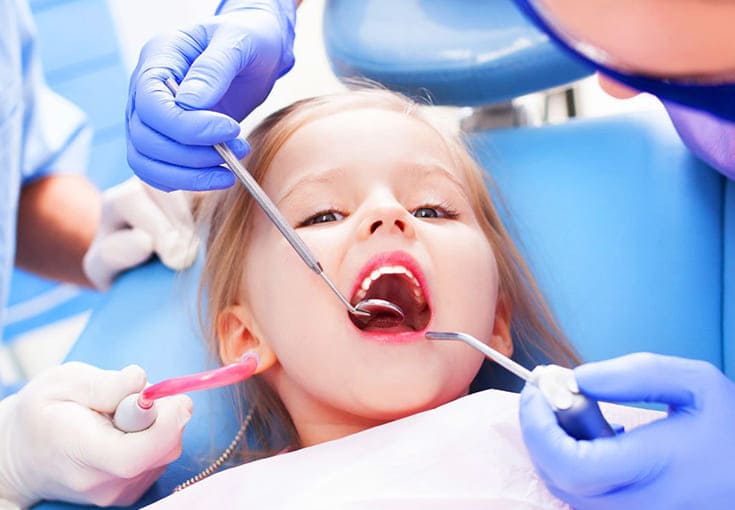
Children Dentistry
Children dentistry is a branch of dentistry that is involved in the oral and dental health of infants and children in the age range of 0-15 years.
Pedodontists doctorate in this field (for 4 to 6 years) and become specialists after their training in the dentistry school. Dental treatments of children by pedodontists will be beneficial in order to conquer the fear of dentists in children and to prevent possible future traumas.
Pedodontists deal with decays and treatments of milk teeth, anti-decay treatments for milk and permanent teeth, extraction of milk teeth and space maintainers.
Children will have both milk teeth and permanent teeth in their oral cavities for a certain period of time. Since untreated decays in milk teeth particularly in this period can jump to permanent teeth also, treatment and control is very important. The false belief that milk teeth will be replaced anyway can damage the permanent teeth also.
Controls by a dentist should start with the cutting of first teeth, and the dentist must be visited for control regularly with intervals of 6 months. The initial examination must be a fun experience with the purpose of instilling the habits of oral and dental care to last for a lifetime and preventing the creation of fear from dentists. Oral and dental construction of the child will be examined in the first visit, and information on oral hygiene will be provided.
Nutritional habits of children are directly proportional with dental health. Eating when and how frequently are also as important as what is eaten.
- Make your child eat healthy foods such as fresh fruits or cheese.
- Keep your child away from sugary foods.
- Give foods containing sugar or starch after the meals not between the meals.
- If your child likes chewing gum, give him/her no-sugar gums or gums containing xylitol.
- Do not give them sugary foods or milk with honey or molasse before bed.
Fluorine Application
Fluorine is an element found in various plants, sea products, water and various tissues of our body that prevents decaying of teeth and strengthen the structure of teeth. Topical fluoride is applied to children with a tendency for decay in their teeth. This ensures the depositing of fluoride in teeth in sufficient amounts and teeth are rendered resistant against decays with strengthened structure. Acid formation by bacteria will also be prevented and teeth will be protected.
Fissure Sealant Application
Decays often start on the pits and fissures of the chewing faces of deciduous and permanent molars. Such areas containing pits and fissures are rather narrow, and decays start because of the accumulation of remnants of foods and microorganisms. Deep pits will be covered with a fluid filling material called fissure sealants with the purpose of preventing decays occurring as a result of accumulation of foods and microorganisms. This way, this part becomes a slippery surface. This is a rather effective protective method applied especially onto the chewing faces of molars.
SPACE MAINTAINERS
Space maintainers are apparatuses used in cases where the milk teeth a lost prematurely and they are constructed to maintain the place of the permanent teeth that will cut later. Milk teeth guide the permanent teeth that will cut later in addition to providing the child with function and esthetic appearance. Developmental impairment and crooked teeth can be seen in the mouth if the space maintainers are not provided in place of milk teeth that are lost with reasons like decays, infection, trauma or any other reason.
For the contraction of space maintainers, mold of the child’s oral cavity is obtained, and a space maintainer will be constructed to fit his/her teeth. This space maintainer thus prepared will be fixed on the teeth by the dentists. The space maintainer will be controlled by the dentist every 6 months till the permanent tooth cuts from under. The space maintainer can be removed when the permanent tooth cuts. It does not harm the child in any way, and it will not prevent chewing.
Trauma
As regards teeth broken in the period of permanent teeth, the broken part can be adhered in place by the dentist is found. Even for the teeth that comes out wholly, it can be replaced by the dentist if the tooth is rinsed with water and placed in milk. However, the same is not possible for deciduous teeth.


